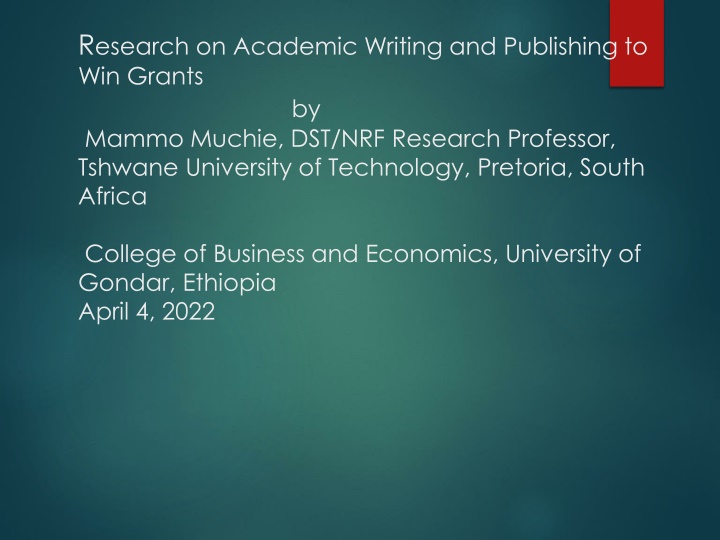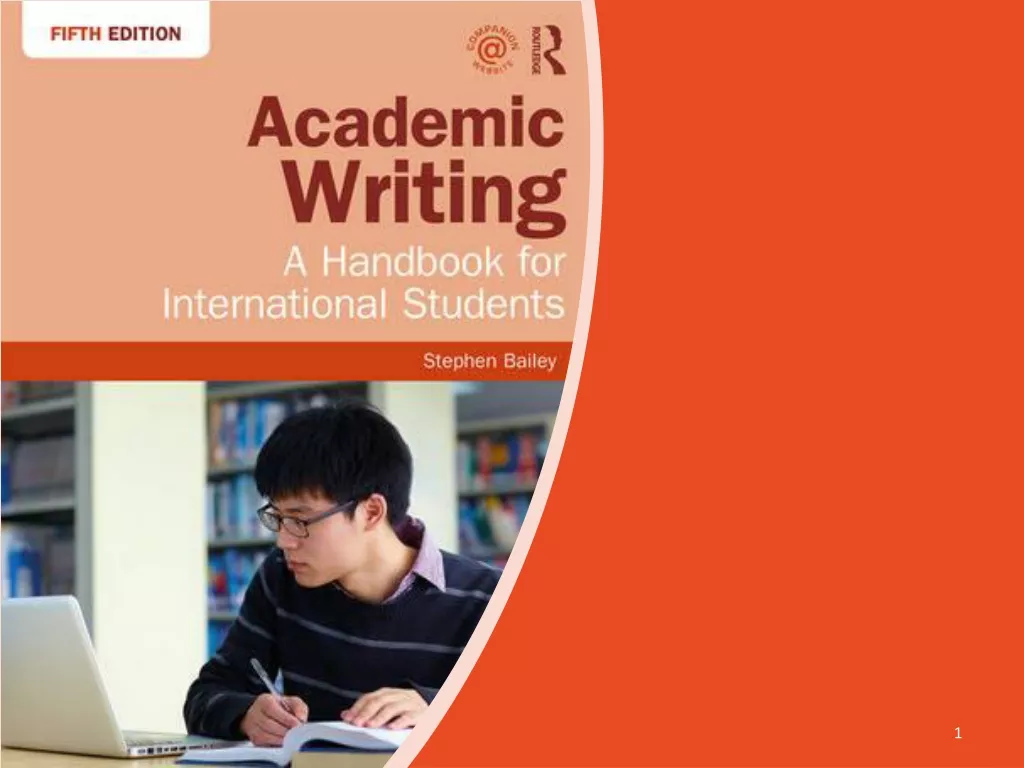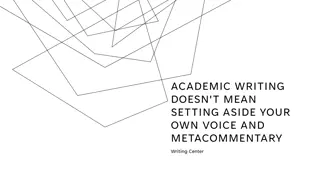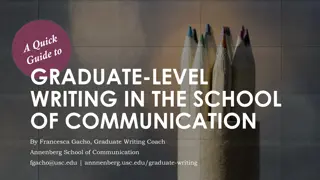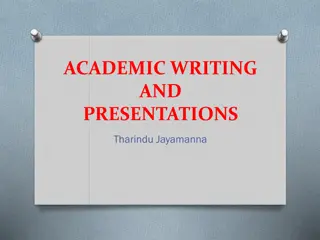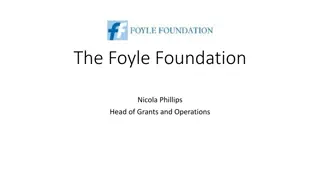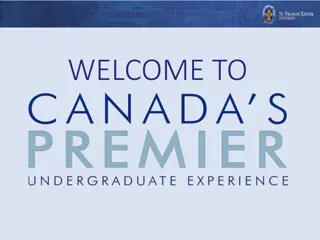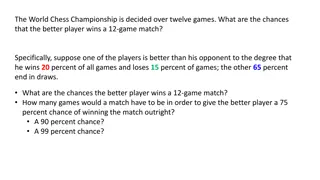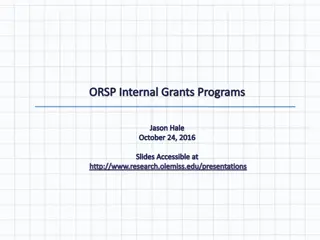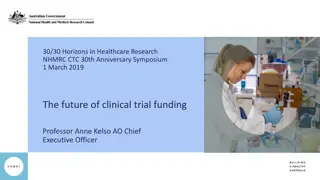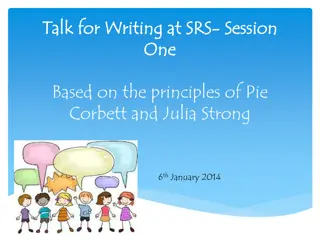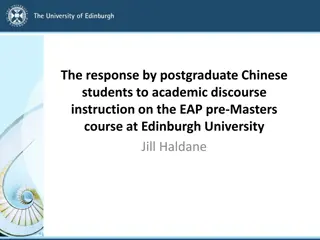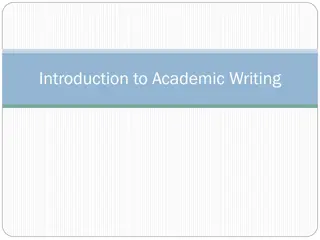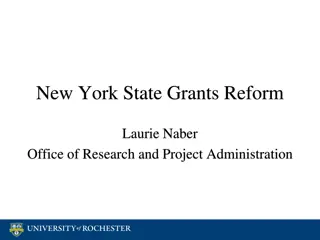Academic Writing for Winning Grants: Principles and Impact
Conducting research is essential for academic and professional success. This research guide by Mammo Muchie provides insights into academic writing, reflective writing, critical writing, and creative writing. Learn how to make an impact with high-quality research output and outcomes, and enjoy the process by treating research as both hard work and fun. Explore the key principles of writing and delve into the different types of writing styles to enhance your research skills.
Download Presentation

Please find below an Image/Link to download the presentation.
The content on the website is provided AS IS for your information and personal use only. It may not be sold, licensed, or shared on other websites without obtaining consent from the author.If you encounter any issues during the download, it is possible that the publisher has removed the file from their server.
You are allowed to download the files provided on this website for personal or commercial use, subject to the condition that they are used lawfully. All files are the property of their respective owners.
The content on the website is provided AS IS for your information and personal use only. It may not be sold, licensed, or shared on other websites without obtaining consent from the author.
E N D
Presentation Transcript
Research on Academic Writing and Publishing to Win Grants by Mammo Muchie, DST/NRF Research Professor, Tshwane University of Technology, Pretoria, South Africa College of Business and Economics, University of Gondar, Ethiopia April 4, 2022
Outline Inspiration What is research Basic principles of writing What is academic writing Reflective writing Critical writing Analytical writing Creative writing References & Concluding Remarks
Inspiration Whether you knew it or not when you started, conducting research is the defining feature of your graduate career. If you plan to stay in academe, it will be the defining feature of your academic life. Lesli Mitchell, The Ultimate grad School Survival Guide
inspiration --Make and enable the future with knowledge innovative research imagination The overall goal of research is to make an impact Address the challenge of research output and outcome with high quality impact Treat research is hard work as fun Do research with action, and take action with research
Inspiration At the heart of all research, is an endeavour to find out, to investigate, confirm, probe, test, see or view, measure, correlate, compare, evaluate, find meaning, gain understanding, or to discover new emerging properties.(Bless, Higson & Kagee (2006)
Inspiration Do research with empathy and feel compassion Do research with love and feel spirited energy Do research with hope and feel positive Know about research with humor and feel fun Know innovation to further research without bias and with positive spirit Don't fail to do research for innovation at all to address the current global risk of massive job losses.
Inspiration Framing the research innovation process From start to completion Knowing what to do and not do Doing what is known clearly Creating high quality output Publishing or producing patent Creating a new venture Reseach output that includes all stakeholders to produce innovative and inventive practice performing and transforming researchers
Research Excellence Achievement Research should be scientifically done in order to solve a problem. Research and knowledge can be synonymous Research output should generate findings that should have tangible qualityand impact on society Research transfer is the purposeful packaging and communication of the findings and output to community service Research utilisation is the application of research-based knowledge in practice and policy with commercialisation Research is knowledge in practice not theory A new paradigm shift to provide an improvement, not just a different explanation by undertaking research excellence provide
Knowledge Exchange Framework Rating Recognition with research awards and rewards for the excellence in research knowledge output Encourage researchers to achieve higher ratings in the KEF.
Research Excellence Framework rating Research Excellence Framework rating Achievement data base and website In the Research Excellence Framework (REF), the system for assessing the quality of research, commercialization of all research output in all fields including the social science research can be a major plus point in evaluating an organization. Impact is graded by assigning a star rating to research, on an ascending scale. The science, technology, engineering and mathematics disciplines achieve many high star REF ratings from their commercialization activities. In principle, social and human science commercialization activities should be able to do the same.
Grant Writing is a Job Requirement 1.Detailed reading 2.Convince and convey to reviewers and funding agencies the quality of research proposal 3. Writing style quality to the grant reviewers 4. Research how past recipients won and lost grant 5. Use time effectively to prepare the research for the grant 6.The introduction of the proposal for the grant is critical 7. Correct budget 8. Seek answers first to all the grant related questions
Meet all the requirements Meet the deadline for submission Clarity on the time of the grant completion process How to reach to the grant agencies? Good to konow how many apply and those that won and lost/ Find proper way to approach the grant funders What are the current trends to prepare the right proposal What areas have been funded recently The limiltations and restrictions
Basic principles of all writing Clarity Conciseness Correctness Precision Mechanical correctness Appropriateness Complete Coherence brevity significance eloquence organization overcoming writers block
Writing research proposal output require Relevance.. Estimating significance vis a vis to outcomes for either practical and theoretical contribution. Justifying why this research must be done Given the research is admitted as relevant can it be done: What is the feasibility for doing it. Time constraints, ressource constraints, accessability to find data Coverage.. Are the right samples identified and included Accuracy.. Will the research produce true and honest findings Objectivity.. How likely is it that the research will produce a fair and balanced outcome Ethics.. How has the rights and concerns of those affected by the research results taken.. The researcher must not ignore any of these concerns in order to undertake research that truly is worth the effort and time put into it.
All Research Proposal Writers Should Know Know by what is meant by academic writing Recognise academic conventions and practices Awareness of structure and argument of writing Awareness of plagiarism and appropriate use of references/citations Organise the needed resources needed to accomplish effective writing
Writing in an Academic Way Requires knowing how to be critical and analytical Ability to use language in a precise & subject-specific way Selection of a topic, question, problem, position or claim to write from essays to thesis Drawing on and citing a range of authors & arguments to support the case to be made Proof reading, reviewing and revising based on feedback
Good writing Keep the title to four to five words Keep information organised Make each word count Make sure writing is well thought out in advance Self-edit your work
What is academic writing Academic writing is: Formal : (impersonal, no slang, use of formal sentence structure) Reasoned (critical thinking: how and why) Impartial (gives a balanced point of view, more than one point of view) Logical (ideas flow logically from one to another: signposts, topic sentences and linked paragraphs) Structured (keeps to the structure of an essay, report etc) Supported (evidence and examples, referencing)
Academic writing Academic writing is about thinking and reasoning. Thinking well and applying sound intellectual standards to your thinking. It involves self-evaluation, thinking about your thinking and being sure that you are not jumping to conclusions.
What is Critical Thinking Assessment of the relationship between claims and the evidence given to support them Exercising judgement in order to interpret and evaluate arguments and evidence Questioning taken for granted assumptions Involves both openness to new ideas and appropriate scepticism
Critical Thinker Questions and evaluates information, for example: What is really important here? How does it relate to what I know already? What standpoint does the writer have? Are there any weaknesses in the argument that is being put forward? What other opinions are there on this topic? Do I agree or disagree with the writer?
Logical Academic Writing To create a piece of writing that is logical requires planning. There are a number of different approaches that you can use to plan an assignment. A good way to plan an assignment is to put down your ideas in bullet points using one page (separate from your written work). You can also create a mind map for your ideas or list a series of questions. Some time planning out what you want to say before you write your work,(e.g. essay, thesis) will help make your writing more logical and save writing time.
Why References To acknowledge another person's intellectual work To make it possible for your reader to locate your sources independently To demonstrate your knowledge of your field and make your writing more trustworthy To avoid being accused of 'plagiarism' (using other people's words/ideas as if they were your own)- intellectual kidnapping
When references is not required When you include information that is: general knowledge (e.g. that Madiba is the first president of South Africa after the post-apartheid era.) Information that is common knowledge in your field Ideas that are definitely your own, and findings or insights from your own research Otherwise be keen to reference The more, the better
Process in Academic Writing Analyse the question Brainstorm ideas Make a plan to guide research Do research to get more ideas for your answer Sort ideas by planning the essay/assignment structure Write drafts Prepare references Edit and proofread
Do Not Make Mistakes It is important to answer exactly what is asked for. If you misunderstand one word in a question it can be enough to throw your assignment right off track. It helps to pick out the instruction words, the conditions of any instructions and the key content words.
What Makes Academic writing clear Content - original, sound research, timely, valuable, justifiable, replicable Selection - (WHAT is included, and in how much detail.) Focused, in sufficient detail that someone else could replicate Organisation - logical, following a conventional pattern for article or thesis Presentation - appropriate writing style, choices of words and phrases. Grammar, punctuation, spelling. Visually: does it look good on the page? Typography, layout, clear diagrams
The Research Genre What research is not What research is not only What research is
Research is not A loose collection of anecdotal information It is not merely reporting others research or knowledge
What Research is The knowledge power to define reality By providing new knowledge, create the opportunity to change reality through knowledge It is the creation of knowledge Contributes to the expansion of the academic frontier Provides solutions to problems and questions Brings original insights and meaning
Review of Literature Examine, analyze what has already been published on the selected topic Find gaps Provide framework for scope of the problem Explain how your study contributes and brings Do a thorough review Accuracy of review essential
Writing in an academic way Critical and analytical Using language in a precise & subject- specific way Adopting a position or claim-thesis Drawing on and citing a range of authors and arguments to support
What is critical writing Argument vs. opinion Evaluate and weigh up ideas, s State point of view Consider available evidence Possible counter arguments Avoid opinion just to express point of views, lack of supporting evidence and personal feelings
Model to Generate Critical Thinking Description Description Where? Who? When? How? What? What? Analysis Analysis Topic Topic Why? Why? What next? So what? So what? What if? Evaluation Evaluation Learning Development University of Plymouth
In critical writing Apply the following: Critical analysis Critical thinking Critical reasoning Critical reviewing Critical work
Analytical writing "Analyze means to separate a subject into parts (analyze), or result of doing so "The process of analyzing involves breaking an object into its parts and examining those parts."
Analytical Writing Evaluates data Sifts from the important from less important Relates one idea to another So the writer must organise Reveal the structure and organisation in the writing Demonstrate how the bits and pieces of the writing fit and
Different types of analyses Different fields require different types of analyses Casual analyses Exploratory Descriptive Demonstrate the logical development of the writing
Why Go Analytical Good to learn and devise systematic pursuit of knowledge discovery of a situation or problem Methodologically appropriate Bring out new facts that were not up front to come open and clear Communicate to different audience with analytical rigour even though different audiences may not agree Manage different unpredictable situations through the analytical reasoning power
Mind Map for Academic Writing
Creative Writing Creative writing is the form of writing that draws on the imagination to convey meaning It can be any writing- fiction or non-fiction that can go beyond academic and technical forms of literature But the creative spark can be used also in academic writing The application of imagination to the material of selected research Effective written communication Learn how others have creatively worked and succeeded
Reflective Writing Reflection is: Thinking about .. Pondering on .. Asking yourself questions about .. Discussing with yourself Trying to work something out .. Making sense of things Learning from experience... Helping you plan for the future ..
Sources for Reflection Everyday events Positive experiences Negative experiences Eventful incidents Unusual incidents Routine activities Important events Meaningful events
Reflective writing Approach Have a pen and paper available at all times Be spontaneous Write down ideas as they come to you Don t worry about structure, order, spelling, grammar Be imaginative Make sense later with the help of a more formalised structure
Reflective Writing Helps you learn from experience Helps you build on your expertise Developing your expertise is an important aspect of evidence based practice Reflective writing can be used as evidence to include in your portfolio to help you achieve your placement outcomes
A Generic Structure Introduction/Th eme Literature Review Aims Why am I doing this? What is known? What is unknown? What do/did I hope to find out? Methodology How is/was it found out? Results What did I find? Discussion What does it mean? Conclusion What is the significance? What applications? Where to next?
Planning the thesis Write one sentence for: Example: Introduction A Masters and PhD are examined by a written thesis Many students do not complete on time Problem addressed Literature/background Late submission is highly correlated with delay of start of writing Create a thesis map and collect material for each chapter throughout study Dissertation plus at least 2 original papers Clear evaluation, clear recommendation and clear indication of work that will follow to enrich research in the specific work Methods to solve problem Results Conclusion
Steps for Writing both thesis and papers How to find a researchable dissertation topic How to develop an integrated research plan The structure and content of the proposal How to write a high quality proposal How to conduct your dissertation research The structure and content of the dissertation
Steps for Writing both thesis and papers How to write a high quality dissertation The steps in the dissertation review process How to choose a dissertation committee How to manage the dissertation process How to publish your dissertation findings Get the review value chain start with yourself, friends and those finally assigned by the publisher Levasseur, R. E. (2011). Dissertation research: An integrative approach. St. Augustine, FL: Mindfire Press.
Concluding Summary Start today, never later Keep title and hypothesis handy Write down skeleton arguments clearly Expand arguments into chapters Keep concurrent folders for each chapter Keep the thesis plan a living plan Simple sentences, simple ideas, linked structures Maintain your project plan (manage, revise, update)
